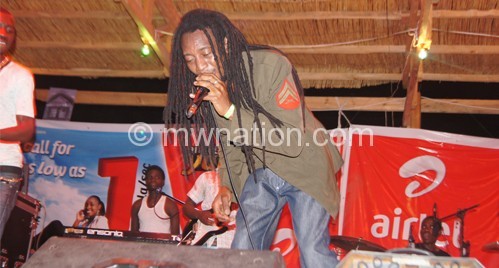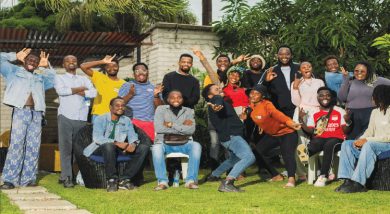Freedom on stage: Musicians find more liberty in performance

In a typical Malawian setting, at pamtondo, women are free to say anything, including topics that are considered taboo. In the same way musicians have found the same amnesty on stage.
The songs that are performed at music shows are different from those that are in most artists’ CDs. Often times, the performance songs are changed to suit current situations or to express the original idea more explicitly.
An example is Mwala Okanidwa by Black Missionaries, whose original goes Ngakhale ndidzayenda mu mthunzi wa imfa/Sindidzaopa choopsacho/Poti Yesu adzandigwira dzanja/Poti ndisunga tsitsi lomwe Mulungu analengalo/ Poti ndimasuta chamba chomwe Yehova analengacho..
Anthony Makondetsa’s would sing Fire Time as ganja time on stage while Sally Nyundo’s Ras Amadya Nzimbetransforms to Ras Amasuta Chamba.
Sally defended the trend of having an alternative performance version, saying it is a way of making stage performances more exciting.
“Stage performance is meant to be interactive and exciting, sometimes you find out that if performed like the original, the song would be flat, boring and meaningless to the situation, so that is why artists improvise to make the performance lively,” said Sally.
The Kukuchedwa Kucha hitmaker argued that some songs are meant for radio and the stage is where an artist is at liberty to say all he can.
However, the reggae musician cautioned fellow artists against the irresponsible use of uncensored lyrics, arguing that they should be used for night performances and not day performances because a day performance is supposed to be for family entertainment.
“One has to know the audience before improvising. As an artist you don’t want to be singing about chamba to 13 year olds,” he hinted.
On his part, Black Missionaries lead vocalist Anjiru Fumulani told Chill that the band improvises lyrics after reading their audience.
“We see the status quo and include some issues which are current just to stay relevant, it is like a free-style” said Fumulani.
He said apart from the lyrics, another aspect that is slightly different is the arrangement of instrumentation.
“Since it is not a studio production, the instrumentation is slightly changed in a live performance and that is the case for all musicians, even international artists,” said Fumulani.
MBC Radio 2 presenter Frank Kandu noted that artists have the liberty to improvise lyrics for live performances to spice things up.
“The artists should read their audience and see how best they can deliver their lyrics, but inciting fans to smokechamba would be ethically wrong and could be illegal too according to the laws of Malawi,” said Kandu.
Andrew Faria, music lecturer at Chancellor College argued that musicians feel more liberated on stage as they fear that their songs will not be played on raid if they are deemed to be offensive to the listener, hence the self-censorship on recored material.
“The other issue is that these artists feel protected by the audience as they are prety sure that no one would interfere a performance, no matter how offensive it may be,” he said.
Farai said on radio, the artists reach out to a wider audience while they only reach out to a specific audience during live performances.
“Black Missionaries, Sally Nyundo and other reggae have a large Rasta following and when they preach about marijuana and other related subjects they are reaching out to their audience and there is nothing wrong in that,” said Faria.
Faria said that the trend is not exclusive to Malawi because artists from other countries also do the same when it comes to stage performance.





